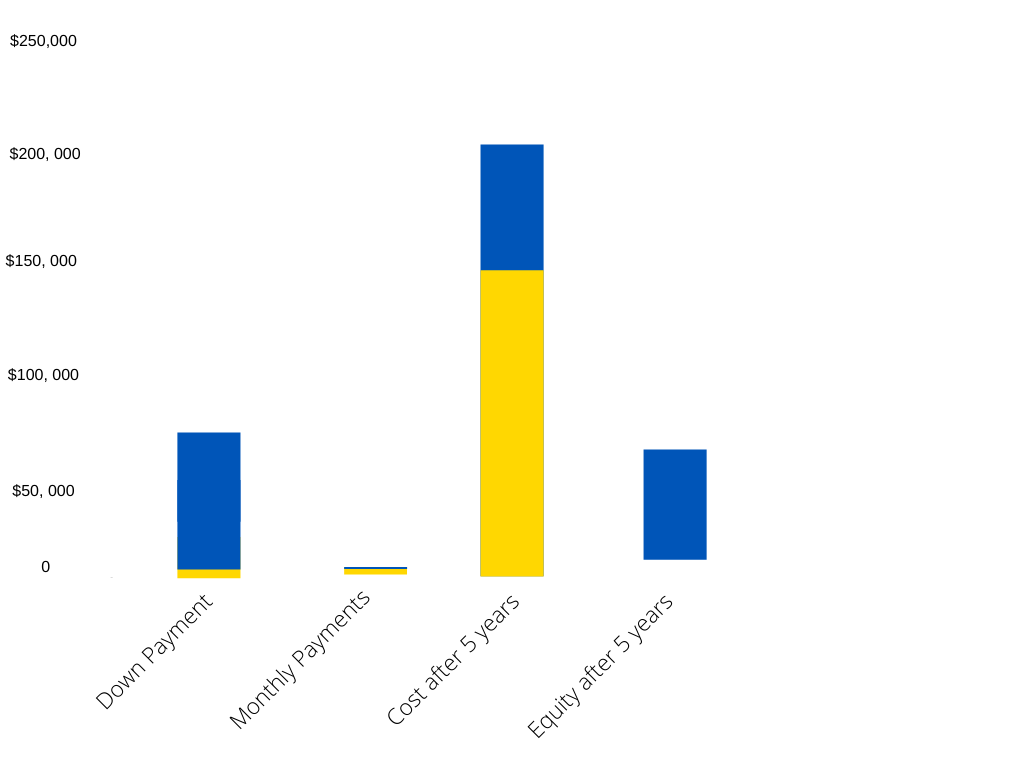Buying vs Renting
When it comes to looking for a new place to live, a question that arises all the time is renting a house vs. buying one. For some, the question seems inconsequential. After all, you will be living in a place no matter which one you choose. However, both renting and buying a house have their own unique perks. One can’t offer what the other does even though the end result will be the same no matter which one you pick. Let’s take a look at the pros for both of them:
Why Rent?
In Toronto, you require a down payment of at least 5% to buy a house. You might see companies advertise rent to own or 0% down payment, however that might not be the best idea. If you haven’t been able to save at least 5% for a down payment, then this probably proves that you can’t afford to own a home at this current moment. Renting and Investing might be a better option.
Renting is less of a commitment and doesn’t tie you down financially in any way. If you plan to move regularly throughout your life, renting lets you move out of a place as soon as your initial lease is over, (typically 1 year). With a mortgage, this isn’t really possible, as there are financial penalties when you break a mortgage and taxes to pay whenever you sell a property.
-
Less hassle and maintenance
Owning a home doesn’t just effect you financially. The daily maintenance and upkeep of a home will demand many hours of your time, as well as a few extra dollars on top. Renting transfers this responsibility to your property manager or Landlord, freeing up your personal time.
Why Buy?
Equity refers to the value of a property once all of the dues and all of the charges have been deducted. Equity is an important thing to know about if you own a house or any property, since it provides you with the basis to sell it later.
Once you pay off your mortgage, you may be able to afford to retire because you will be mortgage free (meaning you don’t have to make a mortgage payment every month). Retirement is much easier when you can cut rent or a mortgage payment out of your monthly living expenses.
Renting out a spare room, is a great idea if you can handle a stranger living in your house. This will generate positive income. Furthermore, you could also rent out the entire house for a specific time period in case you go elsewhere.
Real Example: 35 Brian Peck Crescent
Example: Rent vs. Buy
-
2 bed, 2 bath
-
800 sq ft
-
Can rent for $2,450/month
-
Can buy for $650,000
Costs to Rent
-
Monthly rent: $2,450
-
Total Monthly Rental Costs: $2,450
Costs to Own
-
Down payment: $65,000 (10%)
-
Land Transfer Tax: $9,475 (In the city of Toronto, will be approximately double)
-
Total Cash upfront: $74,575
-
Mortgage: $2,708 ($596,700 at 1.99% interest with a 25-year amortization)
-
Condo fees: $615 (includes heat and air conditioning)
-
Property taxes: $199
-
Mortgage Insurance Premium: $11,700/year
-
Total Monthly Costs: $3,522
Purchasing requires $74,475 up front and extra $1,072 per month. However, at the end of the 5 years you would have paid down $96,951 ($1,616 per month on average) given the low interest rate.
Renting requires first and last month’s rent upfront, and $2,450 per month but the tenant walks away with nothing.
If the condo appreciates by 2% per annum, you will also benefit from $67,653 in equity. If the interest rates where higher, or you believe the market will drop, renting and investing could be an option.

In conclusion, only you can decide whether Renting or Buying a house or condo is best for you. Buying a home is the biggest financial commitments you will ever make, However, if you can make it work, a home can become a great asset to you. If Buying isn’t an option right now you should look at our exclusive Planulife mortgage fund. This would be a great way to help you generate some income and save while you rent.
At Planulife our experienced team of realtors and mortgage agents can help you through the entire house buying process. If you prefer to rent, our team of specialists can help you track down suitable properties for you, and assist you with your investment needs.

Related stories

Understanding Real Estate Investment Trusts in Canada: The Benefits
Introduction These days investing is getting more popular in Canada and many are now switching to Real Estate Investment Trusts in Canada as a feasible way out. Real Estate Investment Trusts (REITs) are organizations that either own, run or fund rent generating real estate. An individual is able to invest on big income producing properties […]

Winter vs. Spring in the GTA Housing Market
In Real Estate, timing is key. You may have the perfect house to sell, in a desirable location, but if you sell it at the wrong time, you may end up receiving tens or even hundreds of thousands of dollars less than you should. Traditionally, Spring has always been the best time to sell, with […]

Why Invest in Durham?
SUMMARY The Durham Region was ranked #1 for population growth, with continued growth forecast. Durham has the highest growth in Home sale prices in the GTA. Metrolink will be expanding it’s GO Transit network by adding 4 new stations in the region. The region has the most decorated GM plant in all of North America, […]